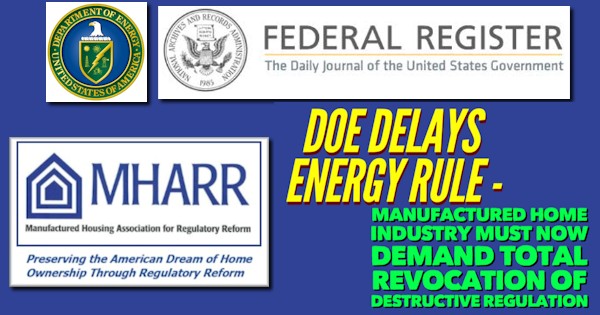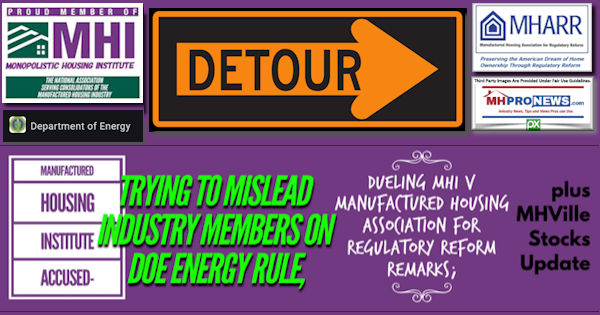The letter by Ranking Member Tim Scott (SC-R) on manufactured housing obtained by Mobile and Manufactured Home Living News (MHLivingNews) is not found on the Manufactured Housing Institute (MHI) website on the date and time shown. But it is found on the U.S. Senate Committee on Banking, Housing, and Urban Affair webpage in the press release shown below and found at this link here on 4.4.2023. Part I of this report provides the press release and Senator Scott’s letter. Part II of this letter provides the scheduling hearing in the pending manufactured housing industry case in Case No. 23-cv-00174 in the United States District Court for the Western District of Texas. Part III links additional related information from MHLivingNews or MHProNews.
Part I
NEWSROOMMINORITY | PRESS RELEASES
APRIL 04, 2023
Scott: Energy Department’s Misguided Regulation Will Make Homeownership Unaffordable
Washington, D.C. – U.S. Senator Tim Scott (R-S.C.), Ranking Member of the U.S. Senate Committee on Banking, Housing, and Urban Affairs, is urging the Department of Energy (DOE) to stop implementing progressive climate policies that will make homeownership less accessible to American families. In a letter to Energy Secretary Jennifer Granholm, Ranking Member Scott warns against asking families to bear the costs of burdensome regulations and asks DOE to follow the law and meaningfully consult with the Department of Housing and Urban Development (HUD) when implementing energy efficiency standards. As currently drafted, DOE’s proposed standards for energy efficiency in manufactured housing will increase costs, reduce affordable housing opportunities, and unnecessarily limit consumer choices, especially for low-income families.
“The DOE Standards are overly broad, unduly burdensome, and undermine commonsense efforts to increase supply and assist families looking for affordable housing opportunities. Moreover, they limit consumer choice for a segment of the market that is unfairly asked to bear the costs imposed by climate alarmists. I ask that you immediately delay implementation of this rule to provide hard-working families relief from this costly and misguided regulation. Furthermore, I ask that you consider withdrawing this rule and incorporate appropriate modifications…to ensure that any future regulation does not irresponsibly contribute to unnecessary costs for Americans pursuing the dream of homeownership,” wrote Ranking Member Scott. ##
That text of that letter is posted below and a copy of the letter is linked above and here.
Part II
April 3, 2023
The Honorable Jennifer Granholm
Secretary
U.S. Department of Energy
1000 Independence Ave., SW Washington, D.C. 20585
Dear Secretary Granholm:
I write to express disappointment in the decision of the Department of Energy (“DOE”) to publish a final rule imposing standards for energy conservation in manufactured housing. Though Congress directed DOE to establish standards for energy efficiency in manufactured housing (“DOE Standards”),[1] such standards must be appropriately tailored to ensure the continued availability of manufactured housing as an affordable housing option. I am concerned the DOE Standards will unnecessarily limit consumer choices and raise costs for families seeking affordable homeownership opportunities.
The Department of Housing and Urban Development (“HUD”) is the primary regulator of manufactured housing, a point you concede in your final rule. Therefore, Congress required meaningful consultation with HUD prior to establishing the DOE Standards.[2] Such consultation is necessary, as Congress has authorized HUD to regulate the manufactured housing industry and receive recommendations from the Manufactured Housing Consensus Committee (“MHCC”) to adopt, revise, and interpret the Manufactured Home Construction and Safety Standards (“HUD Code”).[3] Because, as you know, HUD already updates the HUD Code and has established energy conservation requirements in its regulations,[4] any effort by DOE to develop the DOE Standards should not undermine HUD’s long-established requirements, but must complement existing requirements to ensure appropriate consideration of the affordability and availability of such housing choices for consumers.
Moreover, Congress expressly authorized DOE to consider design and factory construction techniques of manufactured homes when developing the DOE Standards.5 Given the importance attached to this effort, DOE correctly determined that development of manufactured housing energy conservation standards would benefit from a negotiated rulemaking process that included the expertise of representatives of manufacturers and consumers.[5] Notably, DOE consulted with the same set of representatives that comprise the MHCC and assist HUD in developing the HUD Code. It is surprising, therefore, that despite such stated efforts of collaboration, the MHCC determined that DOE “circumvented the standards development process prescribed in [law]” when establishing the DOE Standards and published a rule that it concludes “would adversely impact the entire Manufactured Housing program and cost increases associated with compliance would reduce prospective purchasers (especially minorities and low-income consumers) from durable, safe, high quality and affordable housing.”[6] Failure to impose standards that are consistent with the law and protect affordability is unacceptable.
DOE estimates that the imposition of its energy conservation standards would result in thousands of dollars in added cost for many families looking to purchase manufactured homes.[7] Worse yet, despite recommendations from the MHCC to include the cost of testing, enforcement, and regulatory compliance in the DOE Standards,[8] DOE expressly ignores these foreseeable costs in its rulemaking, admitting that “it has not fully enumerated testing and enforcement costs.”[9] Blatantly disregarding reasonably foreseeable costs associated with such restrictive regulations conflicts with the statutory requirement that DOE consider cost-effectiveness of energy standards for manufactured housing.[10]
Manufactured housing is truly one of the best opportunities for helping families realize the dream of homeownership, accounting for roughly six percent of housing stock and being the largest source of unsubsidized affordable housing in the country.[11] The DOE Standards are overly broad, unduly burdensome, and undermine commonsense efforts to increase supply and assist families looking for affordable housing opportunities. Moreover, they limit consumer choice for a segment of the market that is unfairly asked to bear the costs imposed by climate alarmists.
I ask that you immediately delay implementation of this rule to provide hard-working families relief from this costly and misguided regulation. Furthermore, I ask that you consider withdrawing this rule and incorporate appropriate modifications, in consultation with HUD and the MHCC as statutorily required, to ensure that any future regulation does not irresponsibly contribute to unnecessary costs for Americans pursuing the dream of homeownership.
Tim Scott
Ranking Member
cc: The Honorable Marcia Fudge, Secretary, U.S. Department of Housing and Urban Development
Footnotes:
[1] Energy Independence and Security Act § 413, 42 U.S.C. § 17071 (2007).
[2] Energy Conservation Program: Energy Conservation Standards for Manufactured Housing, 87 Fed. Reg. 32,728, 32,741 (May 31, 2022).
[3] National Manufactured Housing Construction and Safety Standards Act, Pub. L. No. 93-383 (1974), amended by Manufactured Housing Improvement Act, Pub. L. No. 106-569 (2000).
[4] See 24 C.F.R. subpt. F. 5 § 413(b)(2)(A).
[5] Appliance Standards and Rulemaking Federal Advisory Committee: Notice of Intent To Establish the
Manufactured Housing Working Group To Negotiate a Notice of Proposed Rulemaking (NOPR) for Energy
Efficiency Standards for Manufactured Housing, 79 Fed. Reg. 33,873 (June 13, 2014); Appliance Standards and Rulemaking Federal Advisory Committee: Notice of Membership of the Working Group for Manufactured Housing, 79 Fed. Reg. 41,456 (July 16, 2014).
[6] Manufactured Housing Consensus Committee MHCC Working Document from October 18-20, 2022 and
November 15-17, 2022 MHCC Meetings 1 (Dec. 2, 2022), https://www.hud.gov/sites/dfiles/Housing/documents/MHCC%20Working%20Document%20from%20October%20 18-20%20and%20November%2015-17%2C%202022%20Meetings%20.pdf.
[7] 87 Fed. Reg. at 32,749.
[8] Manufactured Housing Consensus Committee supra note 7, at 2.
[9] 87 Fed. Reg. at 32,758.
[10] See § 413(b)(1).
[11] Consumer Financial Protection Bureau Manufactured Housing Finance: New Insights from the Home Mortgage Disclosure Act Data 3, (May 2021), https://files.consumerfinance.gov/f/documents/cfpb_manufactured-housingfinance-new-insights-hmda_report_2021-05.pdf.
The PDF of the letter above is found at this link here.
Part III Additional Linked Information from MHLivingNews and MHProNews
There are facts and evidence to make the following statement. One must recall that big companies and interests have long used the levers of government to limit or harm their competitors. The manufactured housing industry is under assault by an array of forces. Those special interests undermining affordable manufactured homes are both internal and external, as MHLivingNews has evidenced. Those special interests may, at times, posture being a ‘friend’ to manufactured housing. But a closer look reveals that their words are often cheap and lack the support of follow through actions. The DOE energy rule that Senator Tim Scott weighed in on, posted above, is just part of that picture.
With respect to the pending DOE Energy Rule, to learn more, see the following linked reports. That said, one must keep in mind that manufactured housing has had energy efficiency standards dating back to the start of the HUD Code for manufactured housing, which went into effect on June 15, 1976.
With respect to the pending DOE Energy Rule, to learn more, see the following linked reports. As the Federal Register put it on May 31, 2023: “The HUD Code includes requirements related to the energy conservation of manufactured homes.”
It has been so for approaching 50 years. It is pre-HUD Code mobile homes that didn’t routinely build their homes to similar standards. Part of the reason for the HUD Code was to mandate construction, safety, and energy efficiency standards. MHLivingNews has said for years that manufactured homes must meet those basic efficiency standards. Those who want higher standards can routinely option them in. Senator Scott’s point could be reframed in part like this: it doesn’t help consumers if they are priced out of currently affordable manufactured housing under a misguided notion that over the course of years that a home buyer might save that higher cost with somewhat lower utility bills. Manufactured housing is already highly regulated. The amazing option that it offers shouldn’t be seriously limited by overzealous interests that claim to be working for the ‘little guy’ when what they are doing is taking away an option that could trap millions in rental housing (that in numbers of cases are older and not energy efficient) their entire life. ##




That’s a wrap on this installment of “News through the lens of manufactured homes and factory-built housing” © where “We Provide, You Decide.” © ## (Affordable housing, manufactured homes, reports, fact-checks, analysis, and commentary. Third-party images or content are provided under fair use guidelines for media.) (See Related Reports, further below. Text/image boxes often are hot-linked to other reports that can be access by clicking on them.)

By L.A. “Tony” Kovach – for MHLivingNews.com.
Tony earned a journalism scholarship and earned numerous awards in history and in manufactured housing. For example, he earned the prestigious Lottinville Award in history from the University of Oklahoma, where he studied history and business management. He’s a managing member and co-founder of LifeStyle Factory Homes, LLC, the parent company to MHProNews, and MHLivingNews.com. This article reflects the LLC’s and/or the writer’s position, and may or may not reflect the views of sponsors or supporters.
Connect on LinkedIn: http://www.linkedin.com/in/latonykovach
Recent and Related Reports:
The text/image boxes below are linked to other reports, which can be accessed by clicking on them.
Celebrities, Millionaires, Billionaires and Their Appealing Manufactured Homes
Billionaire$ and Millionaire$ Proudly Hang Out in New York Manufactured Homes, Condo Resort
 manufacturedhomelivingnews.com Manufactured Home Living News
manufacturedhomelivingnews.com Manufactured Home Living News
































